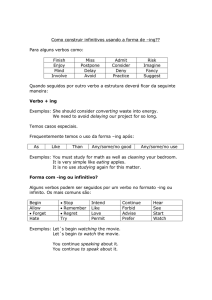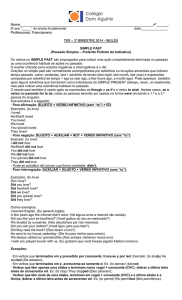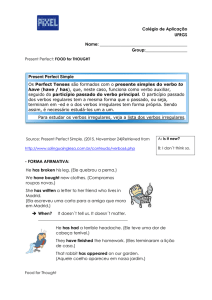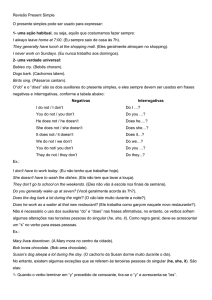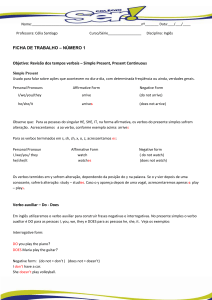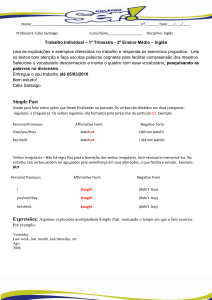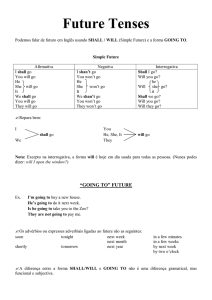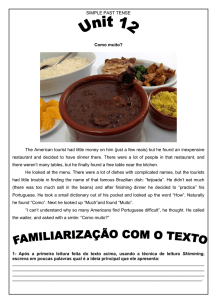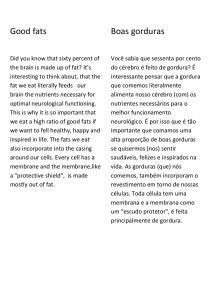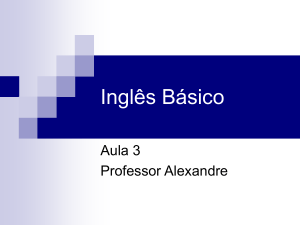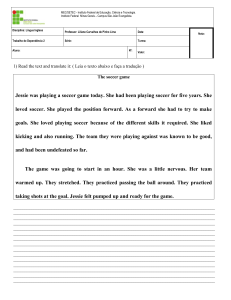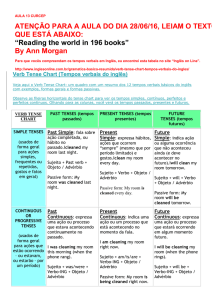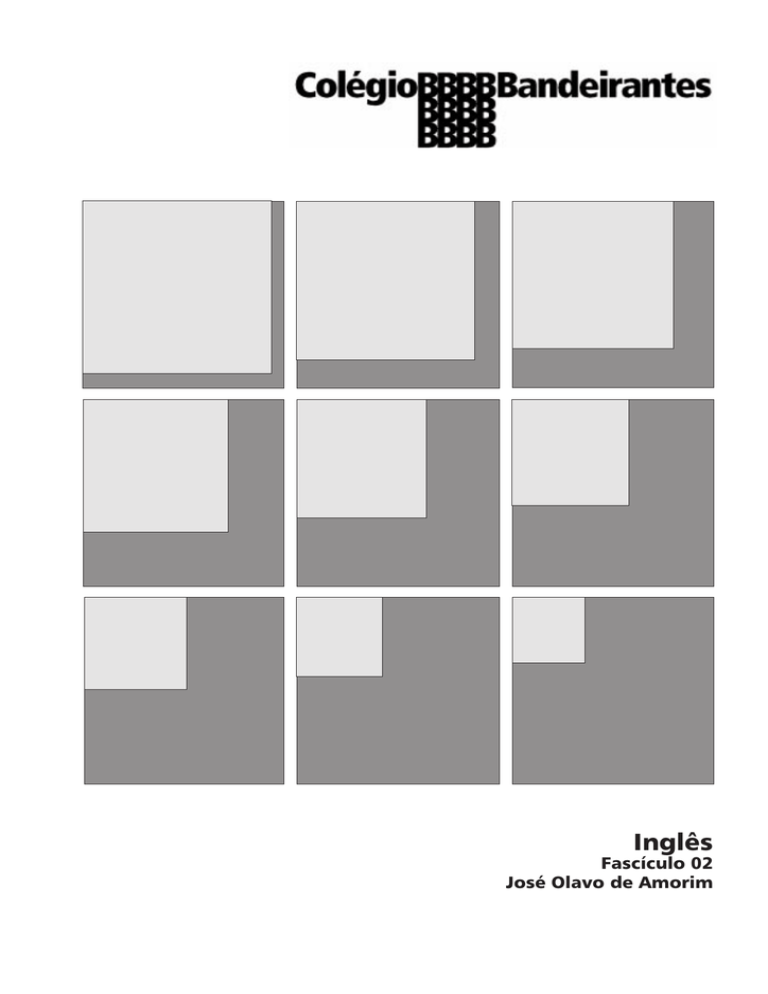
Inglês
Fascículo 02
José Olavo de Amorim
Índice
Verb tenses
Resumo teórico ..................................................................................................................................1
Exercícios........................................................................................................................................... 5
Gabarito ............................................................................................................................................7
Verb Tenses
Na aula 2, vamos trabalhar os tempos verbais da língua inglesa. Lembre-se de que não há
possibilidade de se ter uma sentença sem verbo e sem sujeito, mesmo que inexistente.
Exemplo: There is one song that says it never rains in Southern California.
Lembre-se da aula 1: não basta apenas saber a forma das estruturas gramaticais, mas o significado e o
uso delas também.
Simple Present
É usado para:
• expressar ações habituais, frequentemente (ou não) repetidas
Exemplos:
One of my sister’s chores is to feed the cat. She feeds the cat every day.
Do you ever do your shopping here?
My father hardly ever goes to a soccer stadium.
I don’t often travel by bus. How about you?
If you pay, the story rolls. If you don’t, the story folds.” (Stephen King, best-selling author)
Do politicians mean what they say?
Frequency words: ever = always, never, often = frequently, seldom = rarely, hardly ever = almost
never, sometimes, every day (month, year)
• expressar presente histórico, muito usado em textos de jornal / revista
Exemplos da TIME Magazine – 7 de agosto, 2000:
The Concorde, an aviation icon, crashes as the pilots wage a desperate struggle
The White House plays a risky game at Camp David – and loses. Yet peace hopes to stay alive.
• expressar ações futuras previstas em horário estabelecido
Exemplo:
A: What time does your bus leave?
B: It leaves at 9. There’s time for a cup of coffee.
• expressar verdades universais.
Exemplos:
The sun rises in the east and sets in the west.
Bees make honey.
Chickens lay eggs.
Ice melts if left in the sun.
• deve ser usado também em ‘clauses’ com if, when, as soon as, before, after (a forma será presente,
mas o sentido será futuro.)
Exemplos:
I’ll give the director your message as soon as he arrives.
I know Justin can do it. If he tries hard, he will succeed.
1
Present Progressive (Continuous)
É usado para expressar uma ação momentânea. Para formá-lo, use o presente do verbo to be + -ing
do verbo principal.
Exemplos:
A: What are you doing here? Aren’t you supposed to be at home now?
B: I am working on the financial report for tomorrow’s meeting.
Look! The flowers are dying.
Don’t disturb your brother. He’s studying for the History test.
If your little sister is sleeping, don’t wake her up.
Também pode ser usado para expressar a idéia de que alguma coisa está sempre acontecendo.
Exemplo:
I avoid talking to my neighbor. She is always complaining about life.
Também pode ser usado para expressar ações futuras, devidamente planejadas.
Exemplo:
A: When are you leaving for Seoul, South Korea?
B: I’m leaving tonight.
Present Perfect Tense
Para formá-lo, use a forma presente de ‘have’ como auxiliar (has, have) + o particípio passado do
verbo principal (has written, have done, hasn’t eaten, haven’t checked)
Basicamente, este importante tempo verbal na língua inglesa descreve um fato passado com conexão
com o presente. É geralmente associado aos seguintes advérbios: already, yet, just, ever, never, lately
= recently, so far = up to now, many times, e às preposições since (marca o início da ação) e for
(indica a duração da ação).
Exemplos:
I have already finished doing my Chemistry homework. I can now surf on the net.
Have you had dinner yet?
The (telephone) operator has not arrived yet. There’s no one to answer the phone.
I’ve never traveled by ship. It must be exciting!
A: Have you ever had an arm broken?
B: No, never. Thank God!
Have you seen the mayor lately?
I have not heard from my friends who are studying abroad recently.
Up to now I have replied three e-mail messages only.
Believe it or not, a friend of mine has seen ‘Ghost’ five times.
I arrived at school at 7. It’s 9 o’clock now. I have been here for two hours.
I have been here since 7 o’clock.
Quando se quer enfatizar a continuidade da ação, o Present Perfect Progressive (Continuous) é usado.
Para formá-lo, você deve usar have (has) been + ing form do verbo principal.
2
Exemplos:
A: Your English is very good. How long have you been studying?
B: I’ve been studying English since I was 7 (years old).
I need to stand up and stretch a bit. I’ve been sitting for two hours.
Simple Past
O simple past é usado para indicar uma ação terminada, sem ligação com o presente, num tempo
determinado. As mais frequentes expressões de tempo passado usadas são: yesterday, yesterday
morning, the day before yesterday, two days ago, last night, last week, a week ago, in 1999, last
summer, etc.
Quando se estuda o passado dos verbos em inglês, é necessário lembrar que há dois grupos de
verbos: os regulares e os irregulares. Para formar o passado e o particípio passado dos verbos
regulares, é preciso acrescentar –ed ao infinitivo.
Exemplos:
to finish – finished / to enrich – enriched / to like – liked / to stop – stopped
to copy – copied / to relieve – relieved / to ignore – ignored / to stay – stayed
Os verbos irregulares têm formas próprias para o passado e particípio passado e há necessidade de
prática para seu domínio. É importante lembrar também que essas formas, tanto do passado e
particípio dos verbos regulares quanto irregulares nunca se alteram.
Alguns exemplos de verbos irregulares frequentemente usados:
to begin – began – begun (começar)
to break – broke -broken (quebrar)
to buy – bought – bought (comprar)
to catch – caught –caught (pegar, agarrar)
to come – came - come (vir)
to drink – drank - drunk (beber)
to eat – ate – eaten (comer)
to find – found - found (encontrar)
to go – went – gone (ir)
to know – knew – known (saber, conhecer)
to lose – lost – lost (perder)
to make – made – made (fazer)
to see – saw – seen (ver)
to sing – sang - sung (cantar)
to sleep – slept – slept (dormir)
to speak – spoke – spoken (falar)
to spend – spent - spent (gastar)
to understand – understood - understood (entender)
to write – wrote - written (escrever)
Exemplos:
The singers sang beautifully last night. What a performance!
I spoke to (with) Evelyn yesterday and gave her your message. I’m sure she’ll get back to you as
soon as possible.
3
Did you see the lawyer last week?
Shakespeare wrote ‘Hamlet’.(active voice) ‘Hamlet’ was written by Shakespeare. (passive voice)
On Fathers’ Day we had lunch out and ate grilled fish.
Six people were killed and dozens injured after protests against President Alberto Fujimori of Peru
turned violent. (TIME – August 7, 2000)
I didn’t understand what the teacher explained last class.
Past Progressive (Continuous)
Para formá-lo, use was (I, he, she, it), were (you, we, they) + a forma de ing do verbo principal (was
doing, were sleeping).
O uso mais frequente do past continuous é descrever um fato que estava acontecendo quando um
outro fato ocorreu.
Exemplos:
The phone was ringing when I came into the office.
I was having dinner out when I got the good news of my promotion.
The workers were digging the ground when the explosion happened.
Um outro uso frequente do past progressive é descrever duas ações que, simultaneamente, estavam
ocorrendo.
Exemplo:
While my mom was fixing breakfast, I was making the beds.
Past Perfect
Para formá-lo, use had como verbo auxiliar + o particípio passado do verbo principal (had done, had
gone, had been, etc...)
O uso mais comum do past perfect é descrever uma ação (passada) que ocorreu antes de outra ação,
também passada.
Exemplos:
When I arrived home, my parents had already had (eaten) dinner.
After I had written the letter, I asked the supervisor to sign it.
Simple Future
Para formá-lo, use will (will + not = won’t) + o verbo principal.
Exemplos:
I’ll call Al as soon as possible.
If you do that again, you’ll be in trouble.
As everybody knows, Japan and South Korea will host the World Cup in 2002.
“I’ll be right back with you,” said the salesperson.
A: Alma won’t come to the party.
B: What a shame!
4
Future Progressive (Continuous)
Para formá-lo, use will be + forma de ing do verbo principal (will be studying, will be working, etc...)
Basicamente descreve uma ação que estará acontecendo num determinado ponto futuro.
Exemplos:
A: What will you be doing at 8 tonight?
B: I’ll be having dinner.
I won’t be at home tonight. I’ll be rehearsing for the play.
Future Perfect
Para formá-lo, use will have + particípio passado do verbo principal (will have done, will have
finished, will have written, etc....)
Expressa um fato que, hoje, ainda é futuro, mas que estará terminado num tempo determinado.
Exemplos:
Today is Monday. By Friday, I will have finished reading this book.
I am leaving school now. By the time I arrive home, my mother will have already cooked lunch.
Leonardo will graduate in December. I will see him in January. By the time I see him, he will have
graduated from college.
Exercícios
Test your knowledge
01. A: When ___________________ from South Africa?”
B: Two days ago.
a.
b.
c.
d.
e.
have you arrived
are you arriving
do you arrive
did you arrive
will you arrive
02. There are people who ___________________ trouble. They are trouble makers. What a nuisance!
a.
b.
c.
d.
e.
causes a lot of
are always causing
caused
have caused
had caused
03. We need to wait to be seated. The waiter ___________________ the table.
a.
b.
c.
d.
e.
has laid
will lie
is still laying
is still lying
can set
5
04. During the past three months, Dr David Smith, who is a renowned professor and lecturer,
_______________ to a few countries in the world.
a.
b.
c.
d.
e.
has flown
is flying
will fly
has fled
will have flown
05. I’m reading Chapter III of this book. I mean to finish it by tomorrow. Tomorrow
I ___________________ that chapter.
a.
b.
c.
d.
e.
will read
am reading
read
would finish
will have read
06. “You need to save some money for a rainy day. You ___________________
far too much money," said my father.
a.
b.
c.
d.
e.
spent
are spending
have been spending
had spent
spend
07. Mike joined the English class two weeks after it ___________________. He joined late because he
___________________ on vacation.
a.
b.
c.
d.
e.
started - has been
had started - had been
has begun - was traveling
has started - was
began - has traveled
08. According to the story, the ghost appeared as the clock ___________________ twelve (midnight).
a.
b.
c.
d.
e.
was striking
had struck
has struck
struck
strike
09. “I ___________________ the contract without fail tomorrow,” said the President Director.
a.
b.
c.
d.
e.
6
will be signing
‘ll sign
signed
will have signed
can’t sign
10. “Never in my entire life _____________________ able to buy me.”
Helmut Kohl, former German Chancellor
a.
b.
c.
d.
e.
someone has been
someone is
anyone has been
has anyone been
anyone will be
Gabarito
01. Answer d.
A expressão ‘two days ago’ indica tempo passado, não deixando nenhuma outra possibilidade de
resposta a não ser o emprego do simple past.
Lembre-se de que o Present Perfect pode ser usado para expressar uma ação passada com alguma
consequência ou ligação com o presente.
Exemplo: I have bought a new CD player.
Se você quiser saber quando a pessoa comprou esse CD player, você perguntará: When? Portanto,
when did you buy it?
Assim, nunca use when com present perfect.
02. Answer b.
A alternativa b é a melhor resposta visto que ela enfatiza a continuidade da ação dizendo que
algumas pessoas estão sempre criando problemas.
A alternativa a não pode ser escolhida pelo fato de não concordância do sujeito com a forma verbal. A
palavra people é sempre plural. Além disso, deveria haver uma indicação de frequência da ação.
As demais alternativas não podem ser escolhidas já que se referem ao passado e não há nenhuma
indicação de passado na sentença.
03. Answer c.
A sentença pede o uso da forma do present progressive (continuous) já que está clara a idéia de que
não podemos sentar visto que a mesa ainda está sendo preparada.
Atenção aos seguintes verbos, facilmente confundidos:
to lie - lied - lied = mentir (not to tell, speak the truth)
Never lie to your parents.
I know you’re lying.
to lie - lay - lain = deitar-se, reclinar-se, estar localizado
When I’m tired, I like to lie (down) on the floor. It is very relaxing.
The problem lies in your lack of responsibility.
Italy lies to the south of Switzerland.
to lay - laid - laid = colocar, pôr
Never lay all your eggs in one basket.
The Geography teacher had to lay the map on the table to study it properly.
Who laid the table last night?
7
04. Answer a.
O present perfect deve ser usado na sentença já que a idéia apresentada é a de que Dr David Smith
(já) viajou nos últimos três meses (e deve continuar viajando) para vários países do mundo.
Cuidado com a alternativa d. Fled é a forma passada e o particípio passado do verbo to flee que quer
dizer to escape, to run away.
05. Answer e.
Hoje você ainda está lendo o capítulo III e planeja terminá-lo amanhã. Amanhã a ação de ler já estará
terminada. Essa idéia deve ser expressa pelo Future Perfect (will have + particípio passado do verbo
principal)
06. Answer c.
Seu pai está enfatizando a necessidade de você economizar dinheiro para um momento de
necessidade já que você vem gastando muito. Para enfatizar a continuidade da ação de gastar, o
present perfect progressive (continuous) deve ser empregado.
O simple present, expresso na alternativa e, não deve ser empregado já que não se trata de uma ação
puramente habitual.
07. Answer b.
O uso do past perfect é justificado pelo fato de que há duas ações passadas em consideração. Primeiro
as aulas começaram e Mike estava de férias; somente depois, ele passou a fazer parte dessa classe.
08. Answer a.
O uso do past continuous (progressive) é justificado por expressar uma ação mais prolongada que a
de ‘aparecer.’ Daí a razão de não usar o simple past.
As formas do verbo to strike são: struck - struck (ou também stricken)
09. Answer b.
A sentença revela uma promessa do diretor presidente em assinar o contrato amanhã sem falta.
Para expressar promessas, disposição em fazer alguma coisa ou recusa, decisão, intenção, will deve ser
empregado.
Outros exemplos:
Steve will carry the box for you. I won’t help you now as I’m really busy.
I’ll do it now before I forget.
I think it will be fine tomorrow.
I am sure the meeting will be held at the school on Saturday.
10. Answer d.
A sentença é aberta pelo advérbio never. Toda vez que uma sentença for aberta por uma palavra
negativa (seldom, rarely, hardly ever, almost never, no sooner, etc...) é necessário fazer uma inversão
como na ordem interrogativa (auxiliar + sujeito + verbo principal). O present perfect deve ser usado
na afirmação acima por se tratar de uma fato passado e presente ao mesmo tempo - trata-se de uma
pessoa que está viva.
Lembrete: em sentenças negativas, some não deve ser usado; deve ser substituido por any.
8

